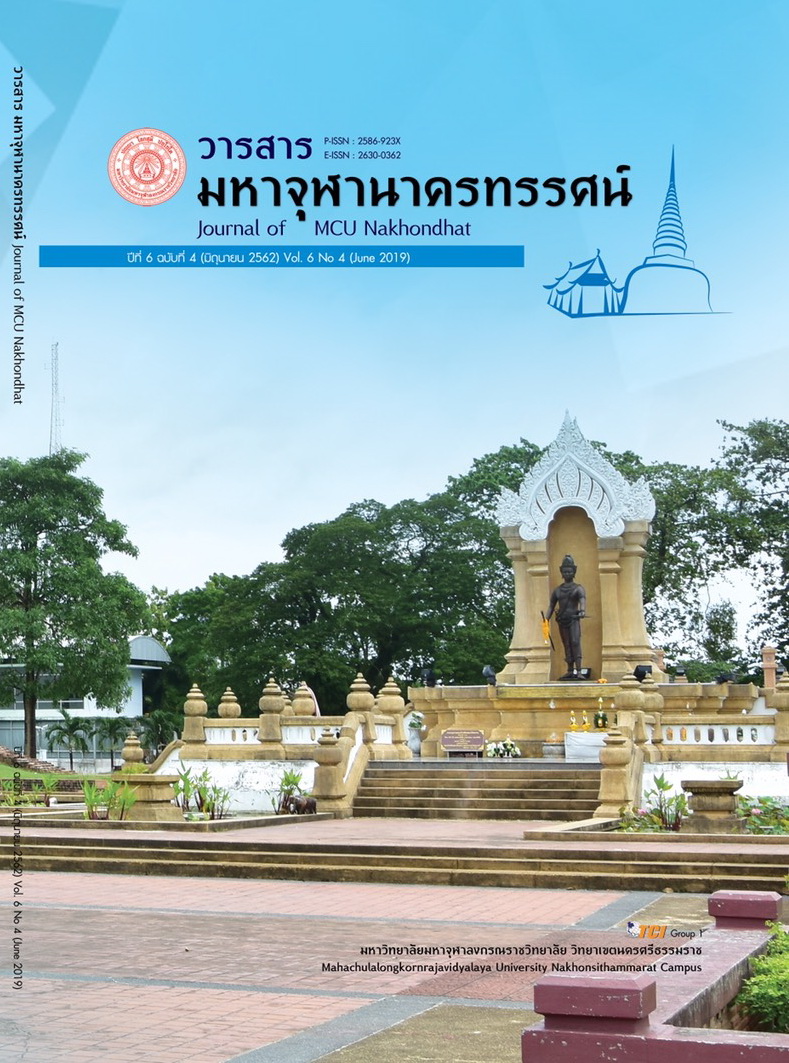RUBBER PLANTATION MANAGEMENT STYLE RICE FIELDS AND OIL PALM PLANTATION OF FARMERS ACCORDING TO BUDDHIST PRINCIPLE IN NAKHON SI THAMMARAT AND SONGKHLA PROVINCE
Main Article Content
Abstract
The objectives of this research are: 1) to study the effects of farmers in making rubber plantations, paddy fields and oil palms 2) to improve the management of farmers in making rubber plantations, paddy fields and oil palms 3) to analyze the pattern of farmers management in making rubber plantations, paddy fields and oil palms on Smart Farm By conducting a mixed research, including documentary research and qualitative research, which links the opinions and development of farmers in making rubber plantations, paddy fields and oil palms on Smart farm together. The researcher selected a sample group by Purpose Sampling, 8 people in Nakhon Si Thammarat Province and 8 people in Songkhla Province, totaling 8 people, and used an in-depth interview to analyze the data and presented the results.
The research found that:
- Farmers who do traditional farming such as rice planting only, rubber plantation only and oil palm plantation only resulting in an Inadequate income, poor productivity, deteriorated soil but applying Buddhism principles as a good tool for managing rubber plantations, paddy fields and oil palms on Smart Farm to be timely Appropriate allowing farmers to develop correctly with stability, wealth, sustainability and safety.
- Adopting the Sufficiency Economy Philosophy and applying the Buddhist way of agriculture to be used for the development of agricultural forms such as not hurting one's self and others, diligence, effort, not being lazy, having good immunity, knowing how to spend property and education, following the prototype farmers and applying technology and innovation to be a guideline to promote and support farmers in having stability in their agricultural production as well.
- Pattern of rubber plantations, paddy fields and oil palms on Smart Farm is to be many agricultural practices in one place, fully integrated, make farmers a better way of life. Both in health and freedom of work as well as being able to engage in other occupations. Farmers have the opportunity to produce products appropriately and in line with the potential and needs of farmers and consumers. And when linking Buddhist principles in everyday life, it will drive the agricultural society to change towards sustainable growth.
Article Details
References
นายจำรัส คงนุ้ย. (11 กันยายน 2561). รูปแบบการจัดการสวนยางพารา นาข้าว และสวนปาล์มน้ำมันของเกษตรกรตามหลักวิถีพุทธในจังหวัดนครศรีธรรมราชและจังหวัดสงขลา. (พีระศิลป์ บุญทอง, ผู้สัมภาษณ์)
นายวิชาญ แก้วปาน. (12 กันยายน 2561). รูปแบบการจัดการสวนยางพารา นาข้าว และสวนปาล์มน้ำมันของเกษตรกรตามหลักวิถีพุทธในจังหวัดนครศรีธรรมราชและจังหวัดสงขลา. (พีระศิลป์ บุญทอง, ผู้สัมภาษณ์)
นายวิชาญ สุวรรณชาตรี. (1 พฤศจิกายน 2561). รูปแบบการจัดการสวนยางพารา นาข้าว และสวนปาล์มน้ำมันของเกษตรกรตามหลักวิถีพุทธในจังหวัดนครศรีธรรมราชและจังหวัดสงขลา. (พีระศิลป์ บุญทอง, ผู้สัมภาษณ์)
นายสาคร ทองปาน. (18 กรกฎาคม 2561). รูปแบบการจัดการสวนยางพารา นาข้าว และสวนปาล์มน้ำมันของเกษตรกรตามหลักวิถีพุทธในจังหวัดนครศรีธรรมราชและจังหวัดสงขลา. (พีระศิลป์ บุญทอง, ผู้สัมภาษณ์)
นายไสว รัตนถาวร. (12 กันยายน 2561). รูปแบบการจัดการสวนยางพารา นาข้าว และสวนปาล์มน้ำมันของเกษตรกรตามหลักวิถีพุทธในจังหวัดนครศรีธรรมราชและจังหวัดสงขลา. (พีระศิลป์ บุญทอง, ผู้สัมภาษณ์)
นายเอกชัย ขันทอง. (8 กันยายน 2561). รูปแบบการจัดการสวนยางพารา นาข้าว และสวนปาล์มน้ำมันของเกษตรกรตามหลักวิถีพุทธในจังหวัดนครศรีธรรมราชและจังหวัดสงขลา. (พีระศิลป์ บุญทอง, ผู้สัมภาษณ์)
พระมหาสุทิตย์ อาภากโร. (2556). เครือข่าย: ธรรมชาติ ความรู้ และการจัดการ. (พิมพ์ครั้งที่ 3). กรุงเทพมหานคร: โครงการเสริมสร้างการเรียนรู้.
อัจฉรา โยมสินธ์ ดร. (2561). How to be เศรษฐีพอเพียง เกษตรทฤษฎีใหม่ การเกษตรของไทย. เรียกใช้เมื่อ 20 มีนาคม 2561 จาก New Theory: https://sinelovelymos.wordpress.com/2013/01/30/


